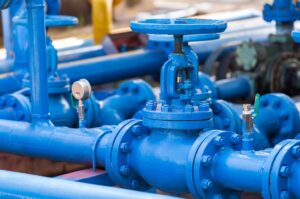The dispute over Nord Stream 2 is approaching its culmination just days before it seems like the works on the final section of this controversial project may start. If its opponents fail to block the construction, they may still manage to prevent gas transmission via the pipe. And their voice is being heard louder and clearer across the West – writes Wojciech Jakóbik, editor in chief at BiznesAlert.pl.
NYT questions U.S. sanctions
The New York Times editorial board published an opinion piece on how „three Trump supporters” took aim at Germany, and by widening sanctions against Nord Stream 2, a gas pipeline from Russia to Germany, caused a „needless provocation”. The board referred to a letter issued by three Republicans to the port in Sassnitz, Germany, in which the politicians warned the harbor against the consequences of supporting the construction of Nord Stream 2. Akademik Cherskiy, the Russian ship that is to set out to Danish waters to finish the last 160 km of the contentious twin pipeline, is stationed there. In July the Danish Energy Agency agreed for ships without dynamic positioning to construct the pipeline, which may speed up the work of Cherskiy. The work may start any day now.
Despite being presented by the NYT as an initiative of three congressmen, the letter is in fact an element of an across-the-aisle initiative in Congress, which adopted a bill to extend sanctions against Nord Stream 2. The previous set of restrictions forced Switzerland’s Allseas to withdraw from the project. The new ones may impact European companies engaged in the endeavor, such as the mentioned German port and financial partners of Nord Stream 2. In fact, they may stop the construction altogether, or make it impossible for the pipe to work after it’s finished.
Despite that, the NYT journos believe that one could question the thesis that NS2 is a threat to Europe’s energy security and the security of the U.S.A. They reiterate that Russian gas was already flowing to Europe via Ukraine and the continent had „no shortage of gas”. In their opinion, the Trump administration’s unilateral actions led to its international alienation, while threats against Germany are contributing to weakening the already stressed relations, and on top of that, bring Russia and China closer.
One could point out that the opinion of the NYT is similar to the behind-the-scenes scheming of diplomats in Washington to support NS2. They tried to make an impression that the majority of EU states were against the sanctions against this project, which meant they defended the pipe. It quickly turned out their claims were completely false, about which I wrote in a previous article. While the NYT’s opinion is unpopular in the West, it does remind numerous press articles from the Russian-speaking media.
Undermining Nord Stream 2 in Europe
In Germany itself the criticism of Nord Stream 2 is growing. Last week the prestigious daily Handelsblatt called for stopping the project after Aleksei Navalny was poisoned in Russia. We reported on this on BiznesAlert.pl. „There is one exceptional way Germany may threaten Moscow. The Russian gas pipeline Nord Stream 2 under the Baltic Sea, which is supported by Berlin in the European Union, needs to be stopped in its tracks,” the daily wrote. „Decreasing the reliance on Russian oil and gas has another political dimension as well. Projects such as Nord Stream 2 allow Russia to earn money necessary to maintain its apparatus of repression. The lesser the dependence on the East, the easier it will be to defend against the possible revenge of Russia for the new, stricter sanctions,” the article continued.
Frankfurter Allgemeine Zeitung joined the appeal. „There is no use talking about a fresh start when it comes to the relations with Russia. The Navalny case and the events in Belarus have proven this yet again. Putin needs to finally feel the consequences,” Friedrich Schmidt wrote for FAZ. „The West is all too often inconsistent and there is too much defiance,” he added. He believes German support for Nord Stream 2 „which serves the Kremlin’s foreign policy goals is especially harmful”. „Anybody who does not support Putin’s actions in Russia and abroad should look for agreement wherever possible, but at the same time clearly condemn bending the rules and putting a price tag on such actions,” the journalist, who is FAZ’s correspondent in Moscow, sums up.
It looks like the growing opposition against Nord Stream 2 in Europe is strong enough to force some politicians, who had not commented on the matter so far, to speak up. France’s President Emmanuel Macron admitted he had reservations over Nord Stream 2. He told about them Angela Merkel, the German Chancellor. Reuters quoted Macron who admitted that he had reservations over Nord Stream 2 because it strengthened Europe’s reliance on gas from Russia. “I don’t think the approach that we ought to have with Russia be one of naivity nor do I think it should be nourished by an increase in our dependence on Russia. This has always fuelled my reservations about the Nord Stream 2 project. The chancellor knows it,” the French President said.
The disputes over the pipe between journalists are a welcome addition to a democratic discussion on the topic. They contribute new arguments from a foreign policy and security stand point that support the idea that the project should be dropped. There needs to be a response to the poisoning of Navalny. Even Chancellor Merkel has admitted this much. However, in the same statement she also stated that Nord Stream 2 was a business venture that should not be impacted by political raws. This is not true. Nord Stream 2 is a threat to Europe and Transatlantic cooperation. Even politcians from the highest echelons of power admit that, e.g. Macron.
Today’s dispute over Nord Stream’s future
While journalists may harm the image of Nord Stream 2, the comments from people like Macron may threated the economic foundation of the contentious project. Macron’s statement may impact one of the project’s creditors – France’s Engie, which could follow Germany’s Uniper and limit its engagement in the project. The pipe is almost done and Russia may want to complete it in the coming days on its own. However, the way this blitzkrieg will end may determine whether any gas will actually flow via the contentious Nord Stream 2 in the future. If Europeans continue to grow uneasy about Gazprom due to Russia’s actions on its own territory and abroad, it may happen that the company’s European partners will become concerned about importing gas from Russia. If Americans decide to widen the sanctions, they may make it impossible to purchase the gas anyway.








